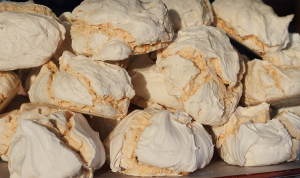
The Basics of Kosher Food
You might be wondering, “is hot chocolate kosher?” It’s a question that comes up often, especially for those of us who follow dietary laws like kosher. But before we dive into the specifics, let’s take a quick trip back to fundamental concepts.
Kosher food is all about following Jewish dietary laws. These laws dictate how we prepare and consume food. There are many rules, but generally speaking, kosher foods come from animals that have been slaughtered in a specific way (shechita) and certain animals must be avoided altogether (like pork).
The whole idea is to ensure that every single ingredient used in making our food aligns with Jewish tradition. This helps us maintain a connection to the ancient ways of Jewish life and faith.
Chocolate’s Kosher Status
Now, about hot chocolate. The answer to whether it’s kosher is a bit more nuanced than just “yes” or “no.” It comes down to ingredients. The key here is understanding the different types of chocolate available for making hot beverages.
For instance, cocoa powder, derived from the seeds of cacao beans, is often used in chocolate drinks. This can be kosher, depending on how it’s sourced and processed. It’s crucial to look at labels carefully because some cocoa powders might not be suitable for kosher diets.
Milk Matters
The addition of milk or dairy is a key factor in determining whether hot chocolate is kosher. There are two main types of milk used in hot chocolate: cow’s milk and almond milk.
Cow’s milk falls under the “dairy” category, making it non-kosher if not processed within strict Jewish dietary guidelines during manufacturing. Almond milk, however, is typically considered kosher, as it doesn’t involve any animal products or dairy.
Sugar and Salt: The Other Ingredients
The “sweetness” of your hot chocolate can also impact its kosher status. Sugar, a common ingredient in many drinks, needs to be examined for potential non-kosher sources.
Generally, sugar itself is considered kosher. But, some sugars might come from plant sources that have potential dietary restrictions, and it’s important to check labels carefully.
Other Essential Considerations
Beyond ingredients, there are other aspects to consider for a truly kosher hot chocolate experience.
First and foremost is the manufacturer of the ingredients. Ensure that they use ethical practices and adhere to guidelines that align with Jewish dietary laws. This might involve working directly with suppliers who specialize in kosher products or sourcing ingredients from trusted sources known for their adherence to kosher standards.
Making Your Own Hot Chocolate
For the ultimate sense of control over your hot chocolate’s kosher compliance, consider making it at home!
This way, you have complete freedom over the ingredients. Start with cocoa powder and milk (choose a kosher-certified kind of course). Don’t be afraid to experiment! You can add spices like cinnamon or nutmeg for extra flavor.
A Word About Labels
Always, always, always check labels! This is the most crucial step in ensuring your hot chocolate is kosher. Reading through the ingredients and any declarations of religious compliance will provide you with clarity on its status.
If you find yourself unsure about a particular brand or ingredient, trust your gut instinct and opt for something else. The safest approach is to always err on the side of caution if there’s any doubt.
A Final Note
The journey of understanding kosher food can be adventurous! This guide has provided some key insights into the world of kosher hot chocolate, but it’s just a starting point. Remember to continue educating yourself and exploring different ingredients and methods. And most importantly, enjoy your cozy cup with joy.


